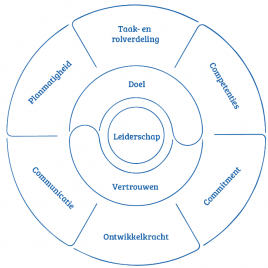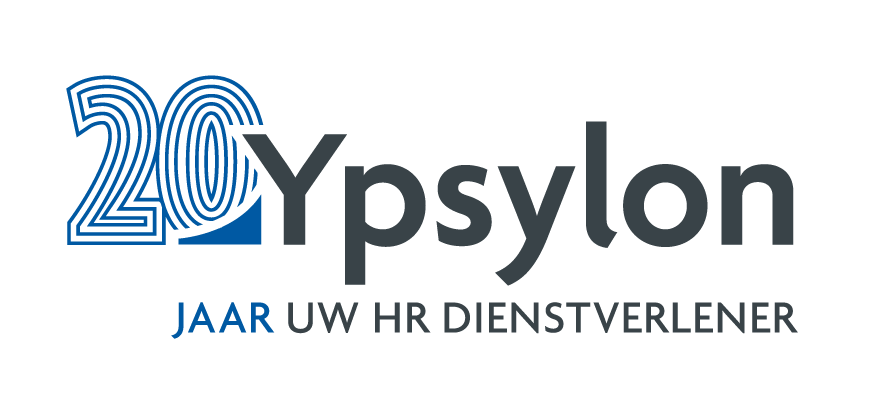How do you make your organization more successful? Of course, by investing in your people. To what extent do you also invest in your teams?
‘Onderzoek van Gallup wijst uit dat Teameffectiviteit 75% "Gallup research shows that Team Effectiveness is 75% determines the success of the organization "
There are many examples of effective and high performing teams. teams. Just think of a successful football team, where the achieved success is many times greater than might be expected based on the composition of individual players. There are therefore many factors that play a role. Insight into individual qualities and team dynamics greatly influence the performance of the team. A number of similarities can be recognized within effective teams:
- The team members know and understand each other's individual qualities
- The team members see the connection between quality and behavior and quality and success
- Strong partnerships are created within the team, that encourage their strength developed
- The team members use each other's qualities to analyze, plan and direct the actions to be taken
‘Teams die aandacht besteden aan elkaars kwaliteiten zijn 12,5% productiever’
How do the teams within your organization perform?
Does your organization pay attention to team development?
Are your leaders able to make teams excel?
Is your management team getting the attention it needs to achieve excellent results?
With a few exceptions, most organizations will not be able to answer yes to all three questions. There is often attention for teams in the form of a team building activity with an exercise that often results in a pleasant drink. Not unimportant of course. But to what extent is there a professional and constructive approach to building an effective and successful team?
What is a Team Assessment?
When designing the Team Assessment, Ypsylon uses the Top Team Model (Steeman), which consists of nine elements that can be influenced to make teams perform better. Using the model, we make various diagnoses, which gives an overview of what the team does and does not perform well at. From this analysis it is quite possible to draw up targeted improvement and development actions. The diagnosis also shows at what level the team is performing. Five levels of performance are distinguished; 1. Not performing 2. Low performing, 3. Performing moderately 4. Performing well and 5. Performing excellently.
The model assumes that Leadership has the most influence on  the functioning of the team and is therefore central to the model. The circle around shows the most important elements after leadership, Purpose en trust.The circle around it contains the other elements of a top team. The three elements at the top of the model are the "hard" elements. The three elements at the bottom are the "softer" elements that are located in the undercurrent.
the functioning of the team and is therefore central to the model. The circle around shows the most important elements after leadership, Purpose en trust.The circle around it contains the other elements of a top team. The three elements at the top of the model are the "hard" elements. The three elements at the bottom are the "softer" elements that are located in the undercurrent.
For us, the essence of the Team Assessment is to map the different building blocks within the team, the dynamics (conscious and unconscious processes) and the core of the problem that hinders any further growth.
We are aware that contextual factors also play a role in team performance, such as relationships with other teams or overarching interests within the organization, but also the organizational culture. In our approach, we therefore include these external factors in the assessment.
What is the ROI of a Team Assessment?
- Insight into the team potential: which team roles and competences can be used better with regard to the team goals
- Effectively breaking through patterns and processes that hinder further growth within the team and better performance
- Prevention of potential conflicts and better mutual cooperation by building stronger partnerships
- Increase mutual involvement, stronger group cohesion and a positive dialogue
- Presentation and a group report containing tools for further development towards a high performing teams. team, so that the team performance is increased
What does the procedure look like?
Prior to the assessment it is relevant to map out the context and possible points of attention of the team. The final program is determined on the basis of this. Participants must complete two online questionnaires prior to the Team Assessment. In addition, we focus on a duration of a maximum of 1 daypart for the Team Assessment in order to burden the relevant team as little as possible, because we understand that time is valuable and the pressure on the operation is high. With this we hope that the Team Assessment will be an attractive intervention that yields a lot, where participants will have an educational and pleasant experience and in which they will be motivated to participate. The assessment also provides a basis for further team building.
Interested?
Is investing in your team the right option? We think so. Teams are more than the sum of the parts, however, there can be many reasons why team potential is not utilized.
Would you like to know more about our options for a Team Assessment?
Please contact Ypsylon


